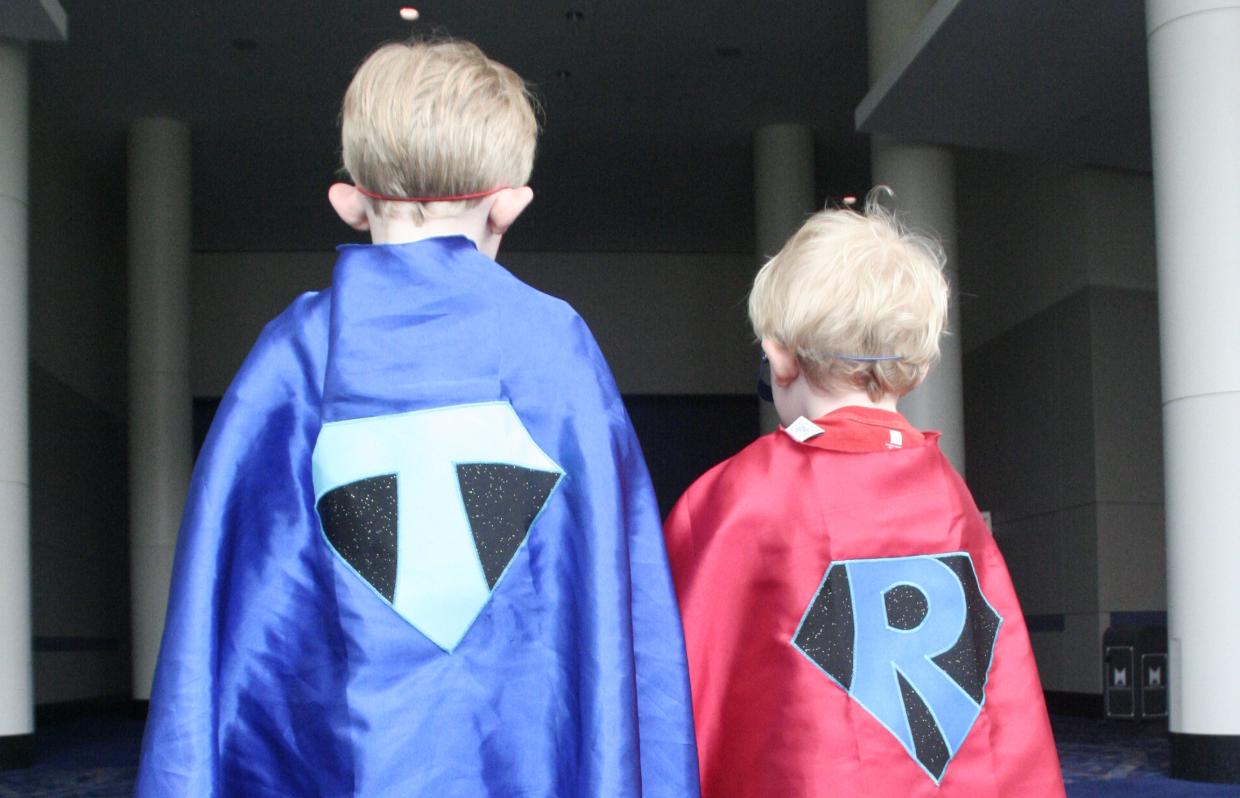Powerful Play
A Parent’s Perspective on the Natural Language of Children

May 2nd, 2014
By Amber Bond
This month Americans celebrated Mothers and motherhood, so for the newsletter feature, our team asked me to write a story from the perspective of a parent. This piece will differ from the others you’ve read, chiefly because, unlike my colleagues, I am not a trained or credentialed creative arts therapist. I am, however, more than halfway through my MA in Clinical Mental Health Counseling, and thus have spent the better part of the last year and a half not only learning about psychological theory and practice, but also thinking critically about myself as a person and as the parent of two young boys, 3 and 5. To protect their privacy, I will call them Ryan and Tom, although these are not their real names.
My own creative outlet is music, so both children were sung to regularly before and after their births. I will admit to having daydreamed that they would instantly be soothed by the sound of a lullaby I had sung during pregnancy, but those hopes were dashed both times. Instead, they preferred musical games in which I helped them dance to music I sang, or inserted their name into a familiar tune. Music was an easy way to recruit 2 year old Tom as an ally while we cared for his brother. We both can still laugh about singing soothing songs in the car to his brother, nonsense tunes with simple words like “Ry-an, Ry-an, we’re almost there. Ry-an, Ry-an, you’ve got no hair.” (Obviously he helped me with the lyrics.)
Left to their own devices, my children frequently express themselves through story and pretend. Dress up and superhero playful wrestling is a daily occurrence in my house. Sometimes multiple genres of story collide, for example when Thor (Tom) and Elsa (Ryan) teamed up to defeat this winter’s record breaking chill. In these stories, I enjoy watching them take turns being hero and villain, or teaming up as heroes together. But by far, their absolutely favorite thing to do is incorporate their parents into the play. Ryan, for example will ask his dad to wrestle as a bad guy. He’ll ask me if we can “fight about some water” which means I must be a villain who refuses to give him a drink of water. This game, as parents reading this might imagine, emerged during a shining parenting moment when instead of reacting to his umpteenth bedtime request for water with frustration, I answered with play. 30 seconds of play fighting over water was all my little dude needed to head into dreamland secure that Mommy understands and values him for who is, not for the grownup he is yet to become.
When I am in a playful mood, free of a “goal” like cooking, doing dishes, or talking on the phone, I find myself most easily able to remember to be in this playful mindset. The mindset enables me to join my children in their world and for us to mutually enjoy each other’s company. Too often, however, I am trying to move my family from point A to point B or to accomplish some task. And yet, when I remember to tell the kids to pretend they are the Hulk doing pushups against the wall in line at Costco instead of ordering them to stand still and stop running around or pushing each other, they feel powerful, valued, and engaged, and I accomplish my goal of making it through the line at Costco.
When I forget this mindset, things sometimes go ok. However, I find that especially when I’m trying to make them do something that’s simply outside the zone of childhood (long lines and grocery stores and grownup parties come to mind) things do not go so well. The kids will remind me that they are kids. They’ll play with each other, with escalating attention-seeking behaviors until I either get frustrated and we leave or the light bulb in my head goes off. When I remember, “oh yeah, they’re kids, they learn about and experience the world through play,”then I can join them, even for a moment, and we can play jungle explorer at the grocery store in search of the elusive and rare fuji apple.
The best part: I get to play too.
